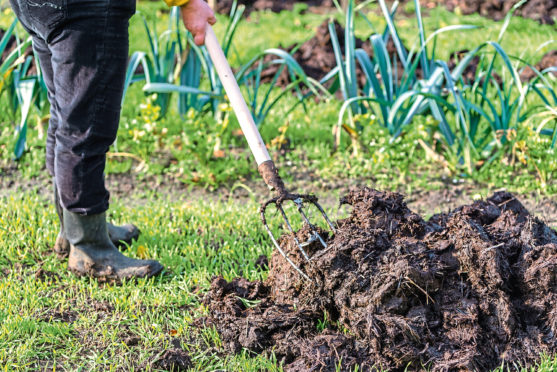
Hardy geraniums are a useful group of plants for growing under roses and taller perennials. Some flower early in summer but one off the best is “Rozanne”, which produces purple flowers from June until October.
The best way to keep the soil in the vegetable garden healthy and productive is to mulch it with compost and, if you aren’t already making your own, then now’s a good time to start.
You could create an open heap, but these tend to spread, so a proper compost bin or a box made from old pallets will keep the ingredients together and help them to warm up faster.
And it’s the heat caused by decomposition that’s the key, killing off weed seeds and speeding up the creation of the soft, crumbly compost that’s so good for the garden.
Mix together soft materials, such as grass clippings, with tougher stems – chopping these up with a spade or shredder before adding them to the heap. Make sure that the mixture doesn’t dry out or become too wet and turn it occasionally to rev up the process with more oxygen.
Don’t expect results overnight. In a chilly climate composting can take a year or longer, and never add fallen leaves to the mix as these take at least two years to decompose.
But, while the process may be slow, the end product is worth the effort as it will add nutrients to the soil and also improve its texture, helping it to retain moisture without becoming waterlogged.
If you practise no dig veg gardening then you’ll need a good supply of compost for top-dressing raised beds.
The idea behind no dig is to disturb the soil as little as possible to avoid damaging its complex structure. Instead, compost is simply spread on top in a thick layer and worms do the heavy work of incorporating it down into the layer below.
Compost can be spread at any time of the year, but it makes sense to use it in autumn as crops are being cleared away and when the soil is still moist and warm and all the organisms that live in it are still active.
Spread it too around crops that will be in the ground over the winter and you’ll also have the added bonus that birds arriving to forage for bugs and insects in its soft surface should also make short work of slugs.
When collecting material for compost, avoid adding perennial weeds as the roots of these may not be broken down and, while raw vegetable scraps from the kitchen are acceptable, meat or anything cooked could attract vermin. So, unless you are using a sealed “hot compost” unit, avoid adding these to the heap.

Enjoy the convenience of having The Sunday Post delivered as a digital ePaper straight to your smartphone, tablet or computer.
Subscribe for only £5.49 a month and enjoy all the benefits of the printed paper as a digital replica.
Subscribe